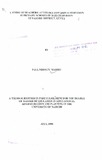| dc.description.abstract | The study embarked on the problem of examining teachers' attitudes towards
supervision in primary schools in Bahati Division ofNakuru District. The relationship
between teachers' attitudes towards supervision and selected demographic variables
was examined. The independent variables that were selected included, professional
qualifications, professional experience, frequency of supervision, designation and
gender. To study the relationship of these variables and teachers' attitudes ten null
hypotheses were formulated.
In order to obtain the study guidelines, literature related to the study was
reviewed. The literature reviewed covered various themes related to supervision.
These themes included attitudes of teachers towards supervision, problems associated
with supervision, supervisory roles and principles of supervision, researches done on
supervision in Kenya and outside Kenya, instructional supervision, leadership and
communication in supervision and the conceptual framework of the study.
The research methodology outlined the research design, target population,
sample of the study, sampling technique, research instrument, validity and reliability of
the research instrument, data collection procedure and data analysis. The research
design was ex.-post facto. The design was found suitable for this study because
demographic variables are not manipulable and it would be ethically wrong to subject
demographic variables to experimental manipulation. The target population comprised
public primary school headteacher.s and teachers from Bahati Division which had 48
schools with 985 teachers, 523 males and 462 females. Thirty schools were sampled
from which 330 teachers were randomly sampled. The headteacher and ten teachers
were sampled in every school. Stratified random sampling was used to ensure that all grades
were equally represented.
The questionnaire was used as a sole research instrument. The data on teachers'
attitudes was collected using an attitude scale, supervisory practice items, items seeking
factors contributing to negative and positive teachers' attitudes towards supervision and an
item seeking information on how primary school's supervision could be improved. To test
the validity of the research instrument 4 headteachers and 40 teachers from four primary
schools were involved. Feedback from the teachers involved in the pilot study was used to
ensure that the instrument measured what it purported to measure.
Split-half method was used to calculate the reliability of the instrument, using odd
and even numbered items. Pearson Product Moment Correlation Coefficient was used to
correlate odd and even number scores. The full reliability of the instrument was calculated
using Spearman Brown Prophecy formula. The obtained reliability was 0.89.
Data was analyzed using two statistical tools, the analysis of variance (ANOV A) and
two tailed t-test. Hypotheses one to six were .tested using analysis of variance, while
hypotheses seven to ten were tested using two jailed t-test. To analyse the open ended items
frequencies and percentages were used.
The following were the fmdings of the study:
1. There was significant difference between the attitude mean scores of different
groups of teachers and their professional experience. Teachers with few years (0
to 4 years) of experience had less mean scores than those with many years (30 to 34
years).
2. There was no significant difference between the attitudes of teachers and the
frequency of supervision. However, teachers who were supervised few times (0 to
4 times) had lower attitude scores than those who were supervised more times (25
to 29 times).
3. There was a significant difference between the attitudes of teachers and their
professional grades. Teachers with the highest grades ATS and S1 and those with
the lowest grades P2 and P3 had more favourable attitudes towards supervision
than the PI teachers.
4. There was significant difference between the attitudes of teachers and their
designation. The headteachers had more positive attitudes towards supervision
than the teachers.
5. There was no significant difference between male and female teachers' attitudes
towards supervision. However, the male teachers had a higher attitude mean score
than the females 3.12 and 3.07 respectiv~ly.
6. On supervisory practices, 60.3 per cent of the teachers said that supervisors were
harsh to the teachers and 63.9 per cent said they could not request to be supervised
while 64.5 per cent said that the comments written by supervisors on the
observation sheets were discouraging. However, 69.4 per cent of the teachers said
that well conducted supervision helped teachers to understand their professional
problems.
7. On the factors that contribute to teachers' positive and negative attitudes towards
supervision 86.7 per cent of the teachers said that supervision that helps teachers to
prepare regularly and properly contributed to their positive attitudes towards
supervision. On the other hand, 87.6 per cent of the teachers said that supervisors
who harassed teachers, gave them orders and were biased contributed most to their
negative attitudes towards supervision.
8. On suggestions of teachers on how pnmary schools' supervision could be
improved, 64.2 per cent of the teachers said that supervisors should frequently
advise teachers, appreciate teachers work and cultivate good working relationship
with teachers.
Recommendations made from the study include:
1. Supervisors should cultivate good working relationship with the teachers by,
informing teachers when to expect supervision, appreciating teachers work and
rewarding hardworking teachers.
2. The Ministry of Education to open colleges or set aside the existing ones to
purely train supervisors on supervision.
3. In addition, all the practising supervisors be in serviced on supervision noting
that they were appointed without prior training on supervision.
4. Frequent in-service courses be organised to enlighten all teachers on how they
can benefit from supervision.
5. Teachers' training colleges should further emphasize the role and importance of
supervision to student teachers.
Areas recommended for further research include:
1. This study be replicated to cover a larger area like a district or a province.
2. The study be replicated to cover private primary schools and both public and
private secondary schools.
3. Teachers attitudes can be affected by other factors besides supervision. Inquiry
into factors like nature of the job and terms and conditions of service can form
basis for further research. | en |

